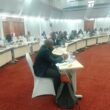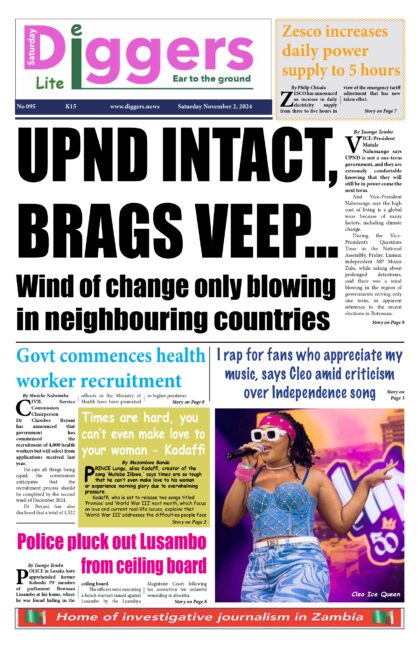THE ELECTORAL Commission of Zambia (ECZ) says the commission has registered a total of 7,020,749 citizens in the just ended voter registration exercise.
And ECZ says the commission registered a total of 14,963 persons in lawful custody, representing 93.52 percent
Speaking during a briefing, Wednesday, ECZ chief electoral officer Patrick Nshindano said the number of registered voters was something to be proud of because it was in tandem with global standards.
“The turnout in the extension period I must mention was not as satisfactory from the point of commission. We did see a low turn out especially in the first three days with a spike in the last day. Most centers especially in the remote part of the country we did even observe zeros in some centers. So that is an indication that we had captured most of the eligible voters that we required to capture and we are pleased with that aspect. To recap, the commission had captured 6,407,752 registered voters and this was during the phases one, two, three and four of the voter registration exercise,” Nshindano said.
“The extended period of four days gave us a figure of 612,997 registered voters. Bringing the total number of registered voters for the entire period of the voter registration exercise to a provisional total of 7,020,749 registered voters. This is a representation of 83.4 percent of all eligible voters. Kindly take note that the figure is provisional as the data collected will be subjected to de-duplications and clean up process. The 2020 register stands at 7,020,749 as I announced earlier. This is something that we have achieved as a country and it is something that we need to be proud of.”
He said the number of registered voters was above the global average.
“When you look at the 2016 register in comparison to the eligible population as it stands now it is important that you get to also understand that the percentage is at 63 percent that is when you knock off the deceased person. In comparison, to the provisional register and the 2016 register, the percentage including deceased when you take the whole holistic number, it is 104.8 percent against the 2016 when you include the deceased. But when you look at all the valid voters on the 2016 register in comparison, it is at 132, 51 per cent of that register. So an addition of 1,722,377 additional voters have been added to the register including when you look at it from an aggregate number in comparison to the 2016 register. For us this extremely pleasing on the part of the Commission because this is above the global average. When you look at most countries in terms of what they are able to capture, by the way there is no country in the world that has been able to capture all the eligible voters, including where they have laws that make it compulsory, countries such as Australia is one of the few if not the only one that has breached the 90 per cent threshold where they have 90.1 per cent,” he said.
“Most of the countries are below that. They average around 70 per cent. If you look at some of these developed democracies, for example if you look at the UK, they have 76.8 per cent, France 74 per cent, Germany 76 per cent, the US if you look at what the census bureau indicates, they had registered 157 million against 245 million eligible voters accounting to about 64 per cent. We come back to Africa, South Africa which is one of those that are deemed to be good models, 76 percent, recently we have been comparing with our neighbors Malawi they had 73 per cent. So I think as a country we have a lot to be proud of what we have achieved in a such a short period of time.”
And Nshindano said the Commission was pleased with the response from persons in lawful custody.
“Out of a targeted number of 16,000 persons in lawful custody, the commission registered a total number of 14,963 representing 93.52 per cent. The commission is really pleased with the response from persons in lawful custody to exercise their right to register as voters,” he said.
Nshindano said the Commission was not able to provide disaggregated data per province at the moment.
“As indicated, the commission will retreat and start the process of consolidating the data from all the registration kits used during the entire period of the voter registration exercise. After consolidating the data, the commission will conduct de-duplications and clean-up of the provisional register. There has been a lot of requests for the Commission to provide desegregated data but we cannot give them because the true picture is that we need to disaggregate the data and understand where people are going to vote from and that is what is going to show the number of registered voters in a particular jurisdiction and region. The data that is going round, if it is not coming from the commission, it is not official,” Nshindano said.
He insisted that the number of registered voters was provisional as the data collected would be subjected to de-duplication and a clean-up process.
“After the de-duplications process, the number of the registered numbers that we have announced is bound to change because if we have duplicate records, those records will be removed. If we have incomplete data, those incomplete data will also be removed. There is a period of objection that is provided for in our statutes for a period of 90 days and anybody who knows and feels that some particular individual should not be on the register, at this particular point in time as guided by our statutes where one is a Zambian holder of a green NRC, 18 years of age and above and does not meet the criteria you are free to object of the inclusion of such a one on the register. There will also be a time when the register will be subjected to inspection,” said Nshindano.







